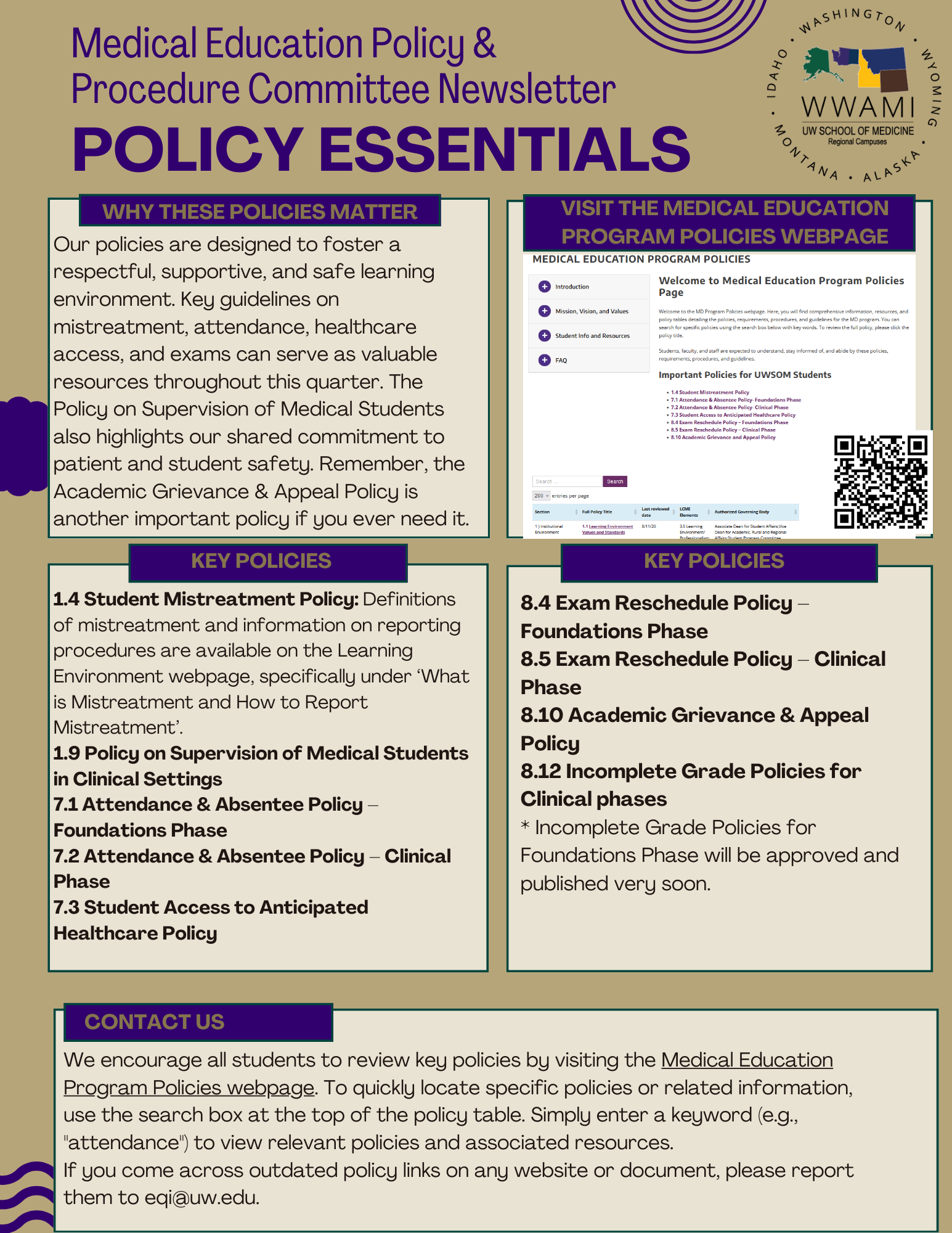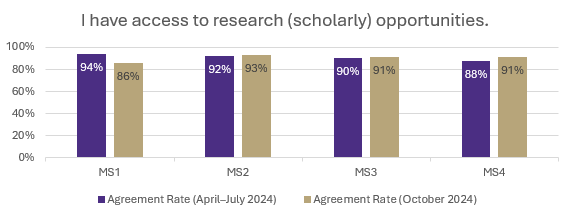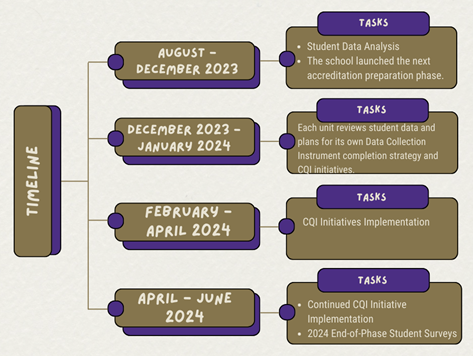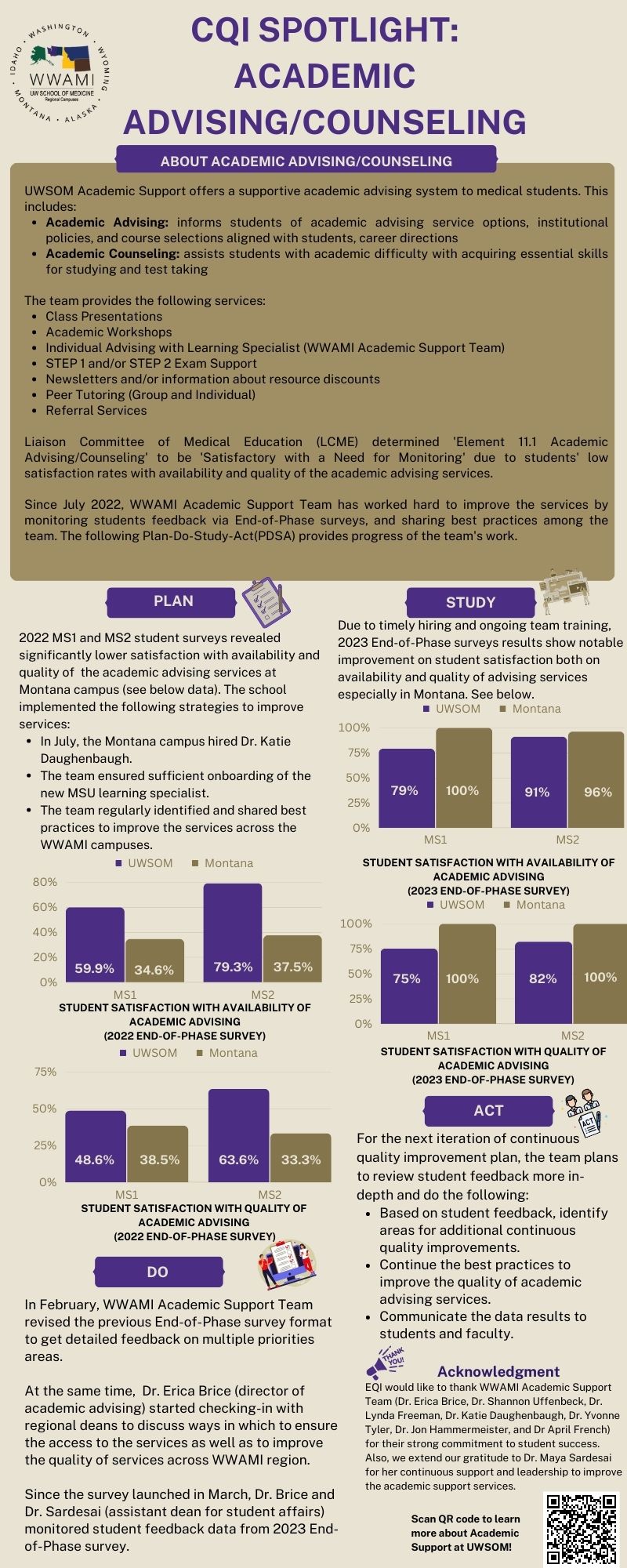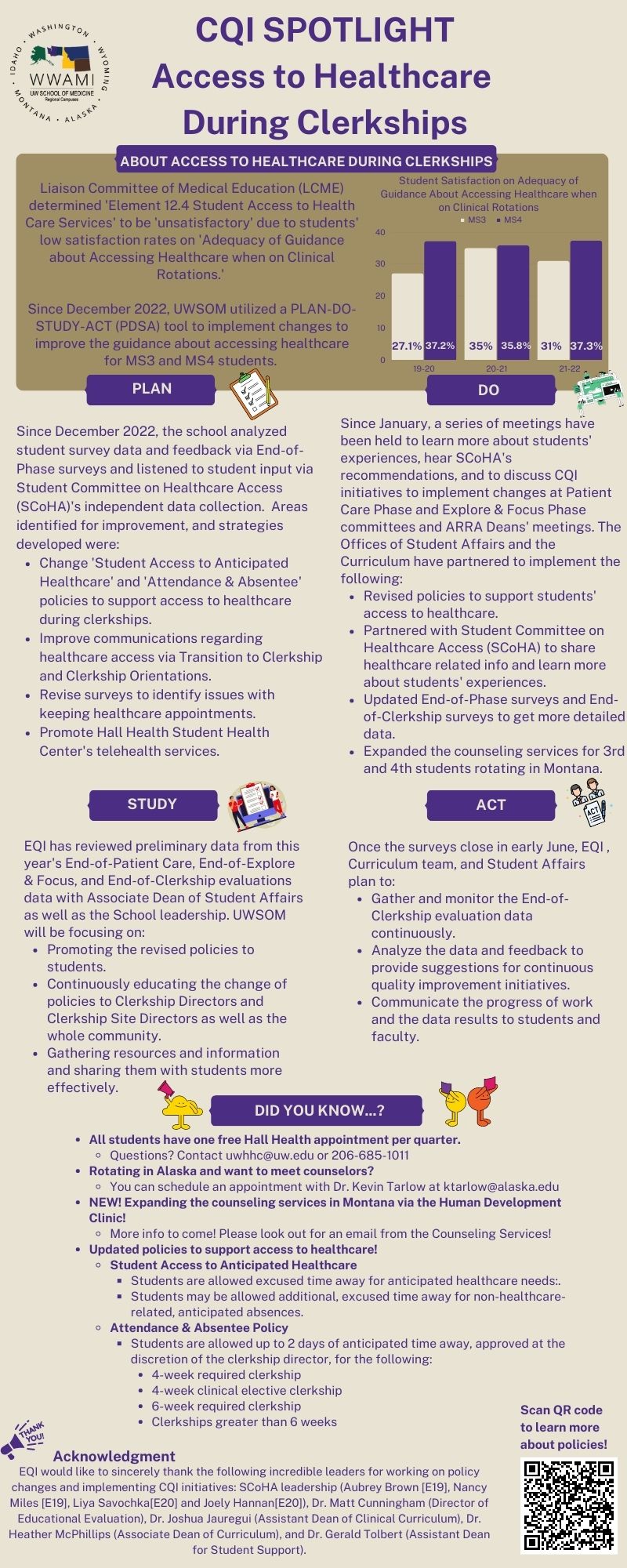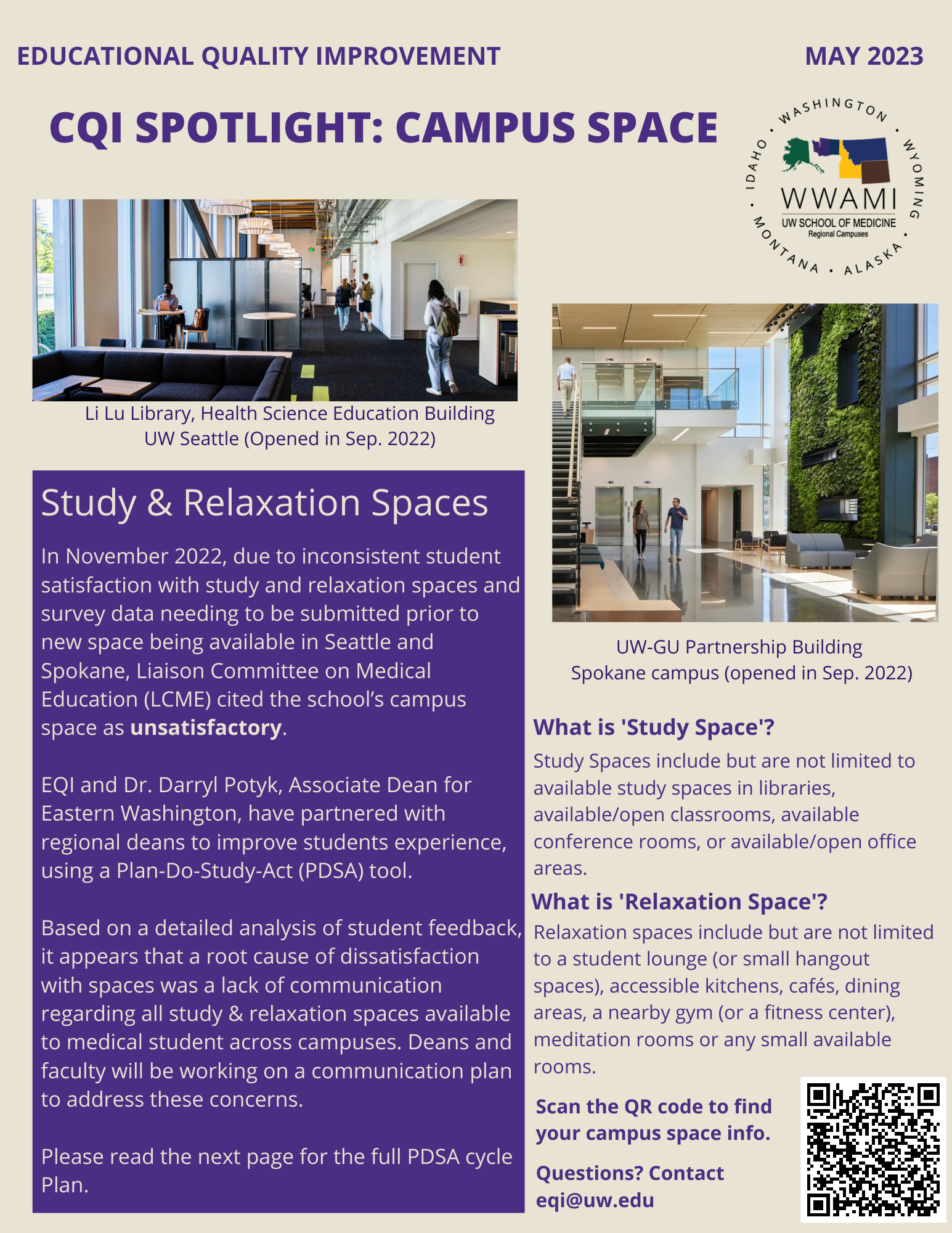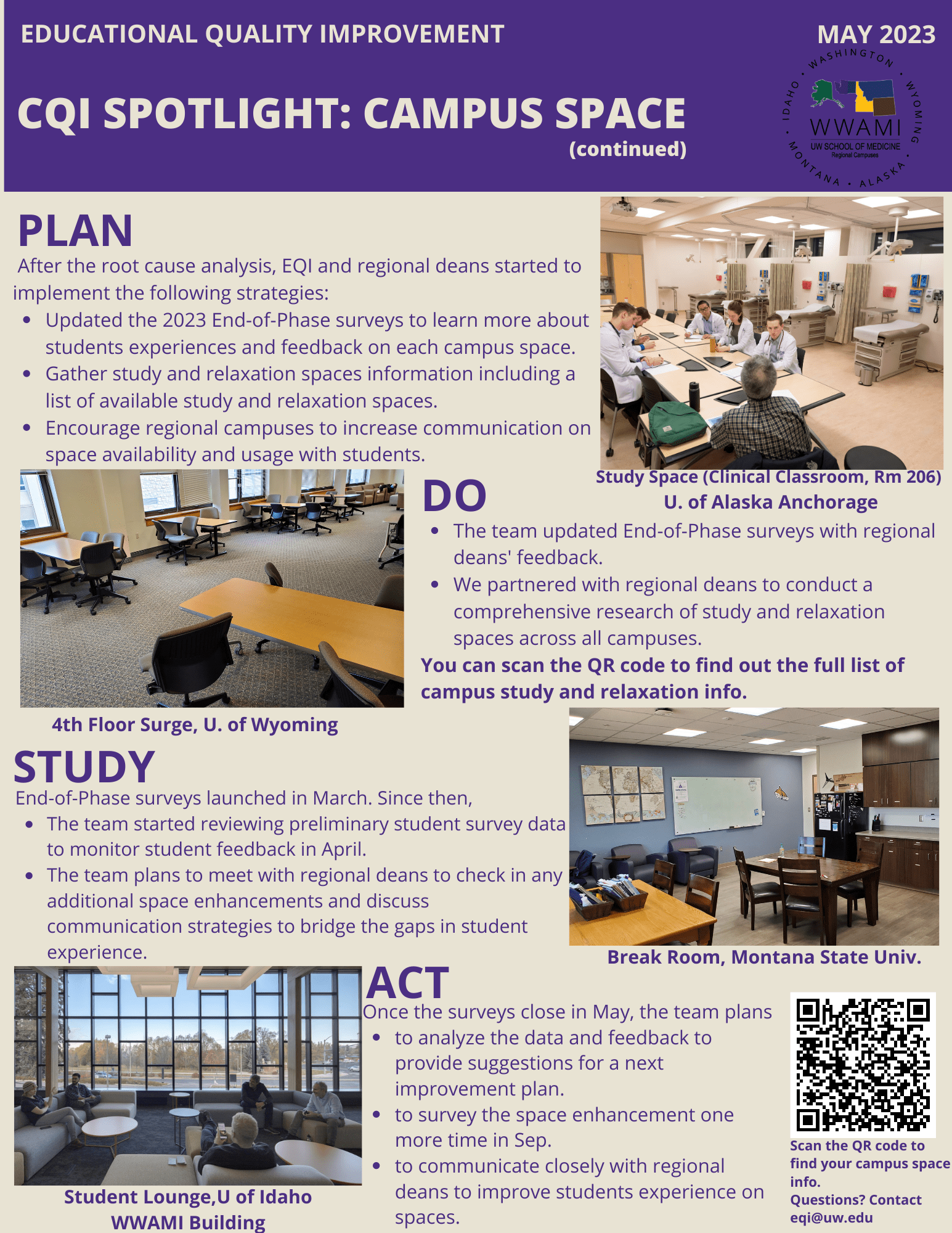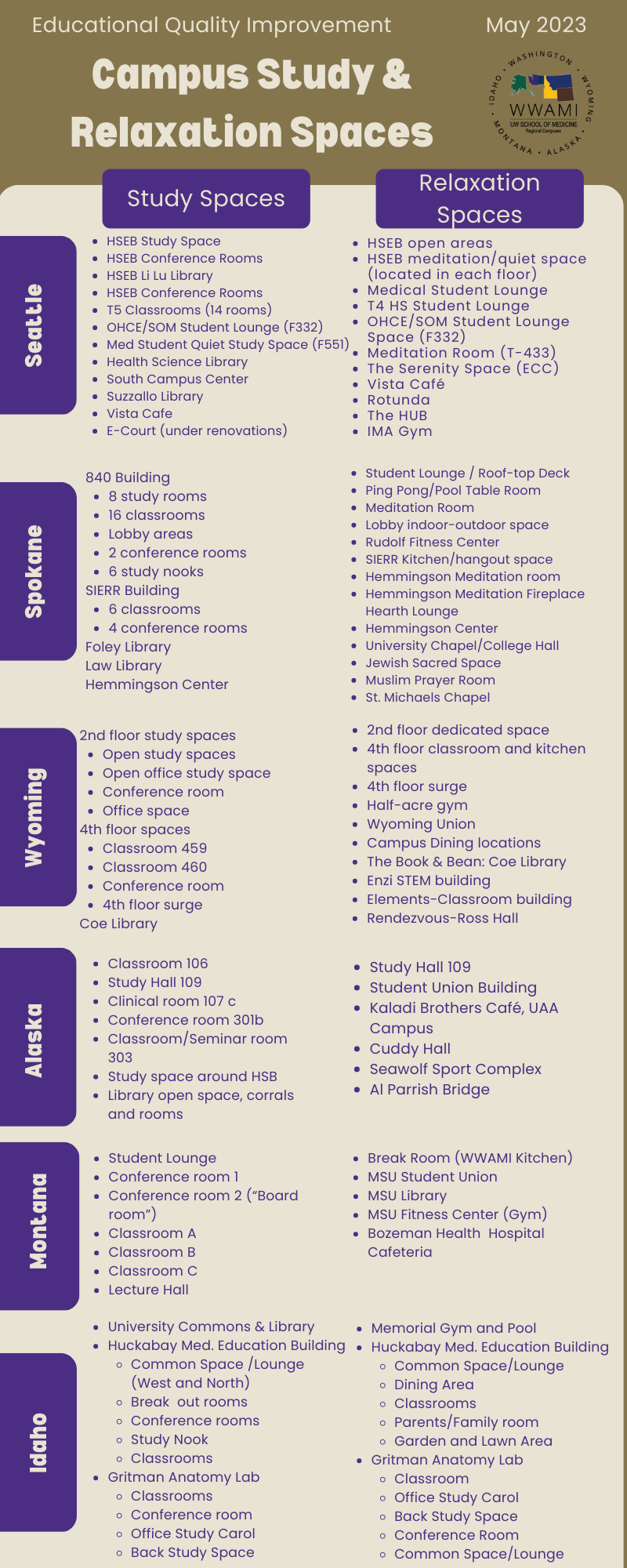CQI Spotlight – Your voice, our actions!
Welcome to the CQI Spotlight Corner! Here you will find all the latest continuous quality improvement efforts that the EQI team is planning in conjunction with UWSOM to address student feedback throughout the year! Please check back often for updates!
The EQI office collaborates with Academic, Rural and Regional Affairs (ARRA) teams to bring a Continuous Quality Improvement (CQI) lens and Plan-Do-Study-Act (PDSA) tools when there’s an opportunity to improve. Below, EQI features CQI best practices implemented by ARRA teams.
As we welcome first-year students, we want to highlight a few key institutional policies that apply across all phases of the MD curriculum whether you’re just beginning in Foundations or deep into your clinical rotations. These reminders help ensure our learning environments remain professional, inclusive, and academically rigorous.
Professionalism & Respect
All students are expected to uphold high standards of professionalism, as outlined in the Policy on Professional Conduct. The Student Mistreatment Policy affirms our shared commitment to a safe and supportive learning environment grounded in the values of excellence, respect, integrity, compassion, altruism, and accountability. For definitions of mistreatment and information on reporting procedures, please visit the Learning Environment webpage.
Compliance & Supervision
Students must meet all compliance requirements to fully participate in the curriculum. Supervision in clinical settings is structured to ensure both student safety and effective learning.
Important Policies and How to Access Them
We also encourage all students to review the following key policies:
- 8.1 Assessment Policy
- 8.4 Exam Reschedule Policy- Foundations and 8.5 Exam Reschedule Policy- Clinical
- 8.10 Academic Grievance Appeal Policy
- 7.3 Student Access to Anticipated Healthcare Policy
- 7.6 Student Hours Policy
All current policies are available on the UWSOM MD Program Policies webpage.
Looking for a quick reference? View these summary documents:
The Liaison Committee on Medical Education (LCME) is the national agency that accredits all MD programs in the U.S., ensuring our medical education program meets rigorous quality standards. In each 8-year accreditation cycle, the LCME issues ‘citations’ on areas for improvement and requires the school to submit status report demonstrating improvement in student experiences and programmatic enhancements. The LCME’s decisions on those reports inform the school of areas of sustained excellence and ongoing need for continuous quality improvement (CQI) efforts.
We’re pleased to share the most recent LCME’s determinations on three areas of outstanding citations:
The “satisfactory” ratings for 3.2 and 5.11 provide evidence of the positive impact of the school’s improvement efforts. At the same time, the “monitoring” status for 12.4 points to additional work the school is required to implement for improving students’ access healthcare during clerkships.
Below, we illustrate LCME expectations for each element, our improvement efforts based on student feedback, and the impact of the work.
YOU SPOKE | WE LISTENED
Element 3.2 Community of Scholars/Research Opportunities
What LCME expects: An environment that fosters intellectual inquiry and provides sufficient opportunities, encouragement, and support for student participation in research and scholarly activities.
- Improvements Made:
- New pathways & partnerships: Launched the Clinical & Translational Research (CTR) Pathway, piloted a RUOP/SoD hybrid, and expanded NIH‑funded MedStAR placements.
- Remote/hybrid expansion: Increased remote project options from 48 to 85 and provided moving stipends for out‑of‑state summer projects.
- Communication & resources: Weekly Zoom office hours (attended by ~40 students), redesigned searchable research database with specialty, location, and remote filters, and a consolidated Triple I online hub
- Impact: 91% (Spring 2024) and 90% (October 2024) of students agree they have access to research opportunities.
Element 5.11 Study/Lounge/Storage Space/Call Rooms
What LCME expects: Adequate study space, lounge areas, personal storage facilities, and secure call rooms for medical students at each campus and clinical site. You asked for clearer info on where and how to use our spaces.
- Improvement Made: Enhanced communication on the available spaces and how to use them
- Seattle campus: Communicated the list of study/relaxation spaces in the new Health Sciences Education Building, main Health Sciences Building, and South Campus Center; opened the renovated ECourt Café as a study/lounge area
- Gonzaga: New Spokane Inland Empire Railroad (SIERR) study rooms; couches in the student lounge; the prayer & meditation room refurbished; orientation tours of all campus and library spaces.
- Wyoming: Reserved study offices on 2nd & 4th floors; movable whiteboards and partitions; orientation tours provided
- Alaska: Added a 195 sq ft WWAMI‑only study hall; orientation scavenger hunt to locate library and Student Union spaces.
- Montana: 24/7 access to the WWAMI suite; partnership with Bozeman Health for additional conference rooms; clear signage for shared spaces.
- Idaho: Sound‑proofing upgrades in WWAMI building; regular communication about spaces and space tours.
- Impact: 87% of MS1 and 89% of MS2 agree they have adequate study and relaxation spaces in both Spring and Fall surveys.
Element 12.4 Access to Health Care Services
What LCME expects: Access to needed diagnostic, preventive, and therapeutic health services at locations reasonable to educational experiences, with policies permitting excused absences for care.
- Improvements Made:
- Policies: Reinforced the Attendance & Absentee Policy (up to two excused days per clerkship) and the Policy on Student Access to Anticipated Healthcare, in partnership with Student Committee on Healthcare Access.
- Healthcare Access website: Updated with in‑region Assistant Clinical Dean contacts for in‑person care and detailed telehealth options via the Husky Health program; linked policies on securing time off for appointments. https://education.uwmedicine.org/student-affairs/health-insurance/
- Wellness days: Built two “wellness half‑days” into each of two integration weeks in clinical phases for appointments without grade impact.
- Data monitoring: Added an End‑of‑Clerkship survey item to track excused time requests; reviewed two survey results. 61% of MS3 and 73% of MS4 agree that they can access personal health care services during the clerkship phase of the medical education program.
- Ongoing work: UWSOM leadership is working with the UW to offer students a health insurance option that will work across the WWAMI region, details coming soon.
NEXT STEPS
In addition to enhancing access to health care during clerkships (12.4), we want to partner with you by examining more deeply the themes raised in the Independent Student Analysis (ISA) report. We’re convening nine focus group sessions, co-facilitated by students with faculty and staff, ensuring your voice guides our CQI work.
Questions? Email us at eqi@uw.edu
CQI Spotlight: Building Bridges to Scholarly Opportunities (LCME Element 3.2 Community of Scholars/Research Opportunities)
UWSOM continues its commitment to fostering an environment of intellectual inquiry and meaningful research opportunities. Central to this mission is the Triple I (Independent Investigative Inquiry) program, which engages second-year students in summer research and scholarly projects through four pathways: Discovery, Integration, Global Health Immersion, and the Rural Underserve d Opportunities Program (RUOP).
Since Element 3.2 Community of Scholars/Research Opportunities was cited by the LCME Committee in 2018, the school has actively gathered student feedback and implemented rigorous Continuous Quality Improvement (CQI) initiatives each year. These efforts address challenges and build on successes to ensure accessible research pathways for all students across the WWAMI region.
Enhancing Research Access: A Data-Driven Approach
Survey data from Spring 2024 survey and the Independent Student Analysis survey conducted in October 2024 reveal notable improvements in student satisfaction with research and scholarly project opportunities:
- First-Year Medical Students (MS1): Agreement rates dipped in October due to the timing of the survey, as students were still acclimating to the program. The Triple I Office focused on early information sessions and improving the online hub to respond to students’ feedback from previous years.
- Second and Third-Year Medical Students (MS2 and MS3): A steady increase reflects expanded research options, including remote and hybrid projects, and improved mentorship.
Program Enhancements Driving Progress
- Expanded Research Options: The number of remote-capable projects increased from 48 in 2022 to 85 in 2024.
- Strengthened Communication: The revamped research database and centralized online resources streamlined access to research opportunities.
Highlighted Initiatives
- Clinical and Translational Research (CTR) Pathway: Launched in 2023, this pathway provided 31 students with the opportunity to learn more about the process of engaging in translational and clinical research, with plans for national presentations.
- RUOP/ Discovery Hybrid: Piloted in Idaho, this option allowed 16 students to combine clinical work with research in underserved areas, with plans for broader rollout in 2025.
- Medical Student Addiction Research (MedStAR) Program: NIH-funded addiction research projects offered summer stipends and long-term mentorship.
Program Impact: Students who complete the Triple I in the summer between the first and second years are offered the opportunity to submit their abstracts to the Western Medical Research Conference (WMRC) in Carmel, CA during the winter of their MS2 year. In 2024, 82 MS2s were accepted to WMRC, with 6 students receiving conference awards for their research.
Looking Ahead
The school will continue to enhance its strategies, using survey data and student feedback to address gaps. With an 85–94% agreement rate across cohorts, we are making steady progress but remain focused on ensuring equitable access to quality research and scholarly project opportunities.
Thank you for your engagement and feedback, which are critical to our success. For more information or to share insights, contact EQI at eqi@uw.edu.
Welcome to the New MD Program Policy Webpage!
We are thrilled to announce the launch of our updated MD Program Policy webpage. This revamped platform is designed to enhance communication, improve accessibility to policies, and support compliance with the LCME standards. Our goal is to provide you with comprehensive information, resources, and policy tables detailing the requirements, policies, procedures, and guidelines for the MD program.
Please note that we are transitioning away from using the pdf MD handbook. The policies published on this website are considered the latest and final versions.
How to Navigate the New Webpage
- Search Specific Policies:
- Search Box: Use the search box above the policy table to enter keywords related to the policy you’re looking for.
- 7 Important Policies for UWSOM Students:
- We’ve highlighted seven essential policies on the front page based on consulting students. Check them out for more information.
- Frequently Asked Questions:
- We aim to answer some of your common questions on this page. Please be patient as we continue to enhance it.
- Content Organization:
- Categorization: Policies are categorized into sections such as Institutional Environment, General Policies and Standards, and Admissions in the very left column. Each entry includes the last review date and the governing bodies for the policy.
Your Input Matters
We value your feedback. As part of our continuous improvement process, we encourage you to share your thoughts on the new webpage design and functionality via an email at eqi@uw.edu Stay tuned for more updates as we continue to enhance our communication platforms!
We would like to extend our gratitude to Tara M. Dumesnil (E23, Seattle) for her valuable feedback, Kim Blakely (Director, Strategic Marketing & Communications), Walter Neary (Communication Specialist), and Medical Education Policy & Procedure Committee members for their contributions.
The Liaison Committee on Medical Education (LCME) Accreditation Status Report Update – 12.4 Student Access to Health Care Services
In this issue, the Educational Quality Improvement (EQI) Unit is excited to share updates regarding one of the medical school accreditation citations. The Liaison Committee on Medical Education (LCME) had determined element 12.4, which addresses student access to healthcare services during clinical training, to be in unsatisfactory standing.
The UWSOM supports students’ access to healthcare and strongly encourages them to obtain and maintain health insurance while enrolled at the UWSOM. With the backdrop of the Washington State law that prevents the school from requiring students to secure healthcare insurance, student access to healthcare has been challenging on multiple fronts. These barriers include the following: (1) lack of an appropriate healthcare insurance plan that is accepted across the WWAMI region during clinical rotations; (2) lack of access to timely and accurate information regarding acceptable healthcare plans and lack of timely information for seeking healthcare during clerkship rotations across the five-state region; (3) lack of clarity about requesting time off for seeking healthcare; and (4) students’ perceived fear of harm that requesting time off for healthcare may reflect negatively on them.
In response to students’ input via annual surveys, two major changes have been implemented, which are elaborated below:
- Policy Changes: These changes are outcomes of the partnership between the Student Committee on Healthcare Access (SCoHA), led by Joely Hannan and Liya Savochka and their predecessors, and Curriculum leadership. It specifies the number of days of time off students can request while on clinical rotations. Two policies were formally approved by all curriculum governance committees in March 2023.
-
- Attendance and Absentee Policy -Foundations and Clinical Phases (Revised): https://education.uwmedicine.org/md-program-policies-handbook/attendance-absentee-policy/
- Policy on Student Access to Anticipated Healthcare- Clinical Phase (New): https://education.uwmedicine.org/md-program-policies-handbook/access-to-healthcare/
-
- Centralization of Healthcare Information for Student Access: SCoHA led the initiative of compiling centralized information regarding healthcare insurance, healthcare access, and telehealth access. In partnership with Student Affairs, the compiled information and guidance have been posted for student access via the following Web links:
-
- Health Insurance: https://education.uwmedicine.org/student-affairs/health-insurance/
- Healthcare Access: https://education.uwmedicine.org/healthcare-access-for-medical-students/
- SOM-Hall Health Telehealth Program: https://education.uwmedicine.org/som-telehealth-program-for-medical-students/
The websites and two policies are shared with students during clerkship orientations.
On November 14th, 2023, Dr. Joshua Jauregui, the Assistant Dean for Clinical Curriculum, Gina Franco, the Assistant Director for Clinical Curriculum, and Mary Sargent, the Clinical Curriculum and Student Progress Specialist requested all Department Clerkship Directors and Administrators to share the new policy and the Web resources widely with both students and clerkship site leaders.
In order to more closely monitor student satisfaction with adequacy of guidance about accessing healthcare when on clinical rotations, the school is now collecting student satisfaction with guidance in the end-of-clerkship evaluation beginning in June 2023. In the past, data collection relied on annual surveys administered at the end of Patient Care and Explore & Focus Phases. The most recent ratings by MS3s and MS4s from the clerkship evaluations show a marked decrease in student dissatisfaction, dropping from 30% in 2022 to 2% with satisfaction increasing from 24% to 64%.
We would like to extend our gratitude to the outstanding student leaders, Joely Hannan and Liya Savochka as well as Dr. Joshua Jauregui, Assistant Dean for Clinical Curriculum and Dr. Matt Cunningham, Director of Educational Evaluation. Their leadership and support have been invaluable throughout the year of improving students’ access to health care.
Lastly, we thank the MS3 and MS4 classes for your input, especially your candid comments on the survey.
If you have any questions or concerns, please do not hesitate to contact eqi@uw.edu.
Summary: here is how we plan to use feedback from your surveys to improve UWSOM
In this issue, the Office of Educational Quality Improvement (EQI) keeps the students (you!) informed of the Continuous Quality Improvement (CQI) initiatives implemented within the UWSOM Undergraduate Medical Education Program. The feedback you have provided on surveys such as the End-of-Phase surveys and AAMC (Association of American Medical Colleges) surveys is at the foundation of CQI. By sharing the overarching CQI plan, the intent is to provide transparency on how your input is used to improve the quality of medical education program at UWSOM.
Continuous Quality Improvement (CQI) serves two core purposes:
- Identifying strengths and gaps in educational programs based on benchmarks.
- Ensuring compliance with the Liaison Committee on Medical Education (LCME) accreditation standards based on your survey data (the next accreditation cycle for UWSOM is AY2025-26).
On October 22, 2023, Dr. Sara Kim, Associate Dean for EQI emailed you a summary data report based on the 2023 student survey findings. Identified for CQI priorities were 64 out of 142 data points based on data trends such as your satisfaction ratings lower than national benchmarks, wide variations in regional campus ratings, etc. Soon, responsible units will start reviewing CQI priority areas for improvement. And they will begin to establish quality benchmarks and goals, and implement strategies tied to these goals, with a plan to regularly monitor outcomes to ensure effectiveness. The table below illustrates a timeline outlining suggested CQI tasks.
We hope this comprehensive approach demonstrates the school’s dedication to meet the accreditation standards and ensures that the school is committed to enhancing the quality of medical education programs. If you have any suggestions of how we can further provide transparency about program improvements, please contact eqi@uw.edu.
Stay tuned as we share specific improvement initiatives regularly!
Element 3.2 Community of Scholars/Research Opportunities (April 2023)
Jung Lee (Director of EQI), Dr. Cynthia Sprenger (Director of Medical Student Scholarship), Toby Keys (Director, Rural Underserved Opportunities Program (RUOP)) and Dr. Collette Abbott (MD, Global Health Immersion Program (GHIP) Director)
Introduction: What does EQI do with your survey feedback?
The Office of Educational Quality Improvement (EQI) oversees the medical school education accreditation at UWSOM. Maintaining the medical school accreditation requires continuous monitoring on 12 standards and 93 elements of the medical education program required by the accrediting body, Liaison Committee on Medical Education (LCME). While monitoring the compliance level of 12 standards and 93 elements, EQI office relies heavily on student feedback. EQI utilizes data from student surveys including the End-of-Phase surveys, Year-2-Questionnaire (Y2Q) and Graduation Questionnaire (GQ) surveys. End-of-Phase surveys are conducted internally and Y2Q and GQ are administered by the Association of American Medical Colleges (AAMC).
EQI understands that completing these surveys can feel onerous, at times, for busy medical students. However, they are critical to improving our medical school. Student feedback guides the EQI’s work in continuous quality improvement (CQI) in partnership with responsible teams. The main CQI tool we use is the Plan-Do-Study-Act (PDSA) tool, which includes the key components for addressing gaps in quality in the educational programs. These components include the following: identifying root causes (Plan), collecting data (Do), implementing changes (Study), and measuring the impacts of the implementation strategies (Act).
Element 3.2 Community of Scholars/Research Opportunities
In this newsletter, we will share the status of the LCME Element 3.2 Community of Scholars/Research Opportunities.
The following diagram shows the LCME decisions on element 3.2 since the last accreditation visit in 2018.
- In 2019, LCME determined the element to be ‘Satisfactory with Need for Monitoring’ and noted that ‘the school has identified additional resources to improve student access to research opportunities at its regional campuses; data on student satisfaction with these improvements are not yet available.’
- In 2021 and 2022, the school submitted two status reports, demonstrating the CQI efforts with data from the End-of-Phase surveys.
- In November 2022, LCME downgraded the Element from ‘Satisfactory with Need for Monitoring’ to ‘Unsatisfactory’ and required another status report due in December 2023. See more info under ‘PLAN.’
Diagram 1. Citation on 3.2 and LCME Decisions since 2018 LCME Accreditation Visit

To resolve this citation from LCME, the school is required to:
- Demonstrate how the school is determining the effectiveness of strategies to provide both clinical and non-clinical research/scholarship opportunities.
- Provide the rationale for further changes.
- Address the persistent student dissatisfaction with the ease of access to research opportunities and the sufficiency of information about the opportunities.
The Office of EQI partners with the Triple I Scholarship team (which includes the directors of RUOP, GHIP, and SoD/SoI) to develop strategies utilizing a Plan-Do-Study-Act (PDSA) tool.
PLAN
During this phase, the units gathered data and feedback to identify areas to improve.
The Triple I team surveys MS2 students experience after they complete their projects in fall. In 2021, the office compiled MS2 satisfaction rate with Ease of Access to Research Opportunities from 2018 to 2020 and submitted the report. See below Graph 1.
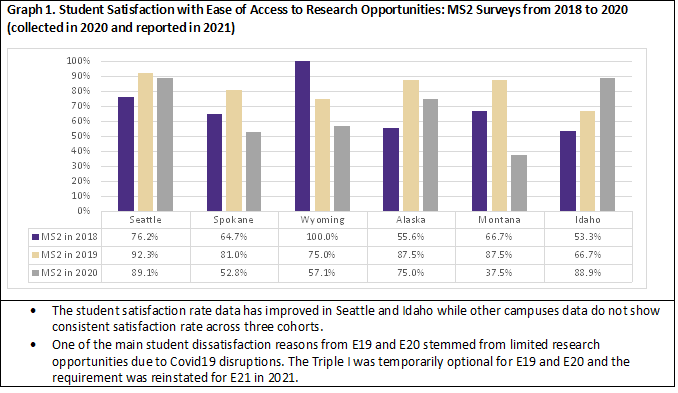
For the 2022 status report, LCME asked the school to survey all four cohorts’ satisfaction rates with ease of access to the research opportunities near Seattle as well as near Foundations site. satisfaction with sufficiency of information about research opportunities. See Graph 2, 3 and 4.
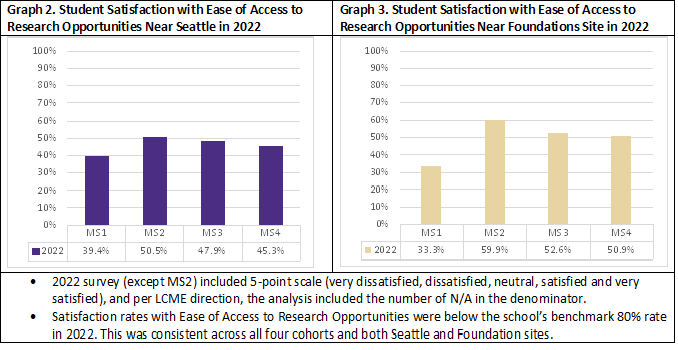
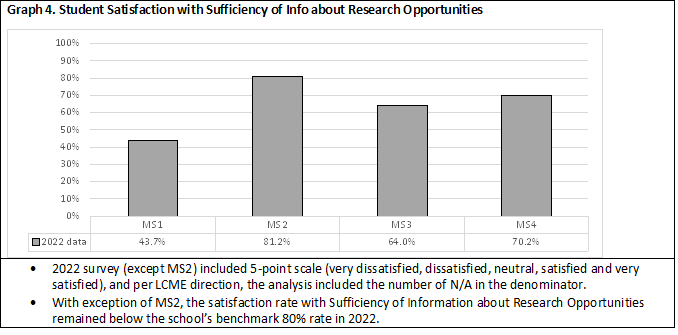
Based on survey data and meetings with stakeholders, the EQI and the Triple I team have identified the following as areas for improvement:
- Newly define the scholarly activities at UWSOM: Previously, the definition of research/scholarly activities only included Scholarship of Discovery (SoD) and Scholarship of Integration (SoI) and did not include community-based scholarly activities such as Rural and Underserved Opportunities Program (RUOP) and Global Health Immersion Program (GHIP).
- Diversify research opportunities: Students desired increased opportunities in remote research options, local clinical research, other options at regional campuses.
- Strengthen communication strategies: information about available opportunities, processes to get into the programs, the diverse range of scholarly opportunities and impacts of students’ research should be shared with the community to increase awareness of ongoing scholarly activities.
- Address barriers to participate in scholarly activities: Some students have shared their financial or summer curricula barriers to participate in scholarly projects.
DO
In this stage of PDSA, responsible units start implementing their plans to address issues and collecting and analyzing data.
Since November, the Triple I team, the Office of Curriculum, and the school leadership have actively worked on developing strategies as follows:
- Broaden the scope of research/scholarly activities surveys.
- Scholarly activities reported in LCME surveys will now include the community-based research programs (RUOP and GHIP) as forms of scholarly activities.
- 2023 End-of-Phase surveys are updated with this definition of scholarship and launched to collect student feedback in March.
- Expand diverse research opportunities.
- The Office of Curriculum has started developing a Clinical and Translational Research Pathway to support students’ scholarly activities. A pilot of this Pathway is planned to begin with the E23 cohort.
- The school started partnering with the Institute of Translational Health Sciences (ITHS) to plan a summer research course for students to engage in ITHS’s research practicum with a tentative plan to start with E24 cohort.
- Implement diverse communication strategies.
- The Office of Curriculum launched a new article called, ‘Scholarship Spotlight’ to highlight students’ scholarly work and share available scholarly opportunities with students.
- The Triple I Scholarship team plans to provide faculty orientations on how to navigate working with summer students on research projects.
- The school plans to tighten communications between the leadership and students by frequently updating available research opportunities/resources and sharing important info/reminders for upcoming opportunities.
- Launch Triple I Workgroup composed with students, faculty, and staff to provide recommendations for the Triple I Scholarship program.
- The Office of Curriculum charged the Triple I Workgroup to gather various stakeholders’ feedback and revisit the III program in multiple ways. The workgroup started examining the current requirement of III Scholarship and exploring the impacts and roles of the current requirement for students’ next steps of career such as residency applications. Also, the workgroup started identifying priorities and unintended consequences, utilizing a UWSOM Equity Tool. The workgroup plans to host multiple meetings with a goal to bring expertise from the finance team (Dean’s Office), the financial aid team, faculty researchers, the career advising team, and a panel of URiM students.
Study
Starting March 14, EQI launched End-of-Phase surveys. During ‘Study’ phase, the Triple I team and EQI will begin close monitoring of the survey results in April. In May and June, the Triple I team and EQI plan to analyze the survey results and study the impacts of implementation strategies.
Act
The last of PDSA cycle is an important phase for refining or developing a next improvement plan. The Triple I team and EQI plan to reflect on what we learn from the previous phases and the results of survey analysis in June and July. Then, we plan to adapt or adopt a plan for the next PDSA cycle.
Next Steps
EQI plans to share the data findings from the End-of-Phase student surveys and updates on the PDSA work in July. Please contact eqi@uw.edu for more information or if you have any questions.
Acknowledgement
While working together with the Triple I team, we learned that this element involves numerous stakeholders and takes a strategic approach with tenacity and focus on supporting students. EQI would like to acknowledge the hard work of the Triple I team, faculty research mentors, clinical preceptors, and staff on Element 3.2 Community of Scholars/Research Opportunities. Lastly, we sincerely thank our students who have provided feedback via surveys and meetings.
Continuous Quality Improvement: Career Advising Team’s Student-Centered and Data-Informed Approaches (December 2022)
Jung Lee, Director of Educational Quality Improvement, Sarah Thomson, Director of Career Advising, Maya Sardesai, Assistant Dean for Student Development
Continuous Quality Improvement (CQI) at UWSOM is essential for two purposes: (1) identifying programmatic strengths and gaps based on available benchmarks; and (2) ensuring compliance with the Liaison Committee on Medical Education (LCME) accreditation standards. Using the framework of CQI, responsible teams identify areas for improvement, establish quality benchmarks and goals, implement strategies tied to goals, and monitor outcomes regularly.
This month, we highlight the Career Advising team’s data-informed and student-centered approach to CQI. The 2018 accreditation visit by LCME resulted in a citation of “satisfactory with a need of monitoring” for Career Advising Services. The main reason for the citation was the lack of data endorsing student satisfaction with the effectiveness of career advising programs.
To resolve this citation, the Career Advising team implemented the Plan-Do-Study-Act (PDSA) tool to address the LCME’s concerns as described in detail below.
PLAN
As the team has strived to incorporate student feedback into their work, the team regularly has invited feedback from their student advisory board, reviews data from internal and external surveys which include all End-of-Phase surveys, internal survey data administered by the team, as well as Graduation Questionnaire (administered by Association of American Medical Colleges). Based on the feedback they received, the Career Advising team identified gaps in students’ access to career advisors and uniformity of services across the five state WWAMI region.
DO
The team implemented the following key strategic initiatives across all three curriculum phases.
- Strengthen the career advising office through investment in personnel and improved operations.
- Increased staffing from two to three positions, including a Director of Career Advising
- Maintain regular points of contact and facilitate work of career advising stakeholders throughout WWAMI.
- Implemented the ‘Campus Connections’ model for equitable access to career advising.
- The ‘Campus Connections’ model is implemented through the Career Planning Process (CPP) which supports UWSOM students in advancing their career goals through longitudinal advising, programming, resources, and engagement opportunities. Each WWAMI site has a dedicated career advisor and each student works with this career advisor throughout their time in medical school.
- Inform students of career advising programs and opportunities through regular communication.
- The team developed communication strategies to engage with students via various meetings and modes of communications such as follow-up emails, student weekly newsletters, a career services online advising management system, as well as a revamped career advising website.
STUDY
After implementing the initiatives above, the team reviewed student feedback from surveys to monitor the impact of their work. The following table demonstrates increased student satisfaction with the overall quality of Career Advising services over the three-year implementation period. MS3 and MS4 students who work closely with the Career Advising team in preparation for their residency applications especially, expressed strong satisfaction (78% for MS3s and 62% for MS4s in 2020, 83% for MS3s and 85% for MS4s in 2021 and 91% for MS3s and 86% for MS4s in 2022).
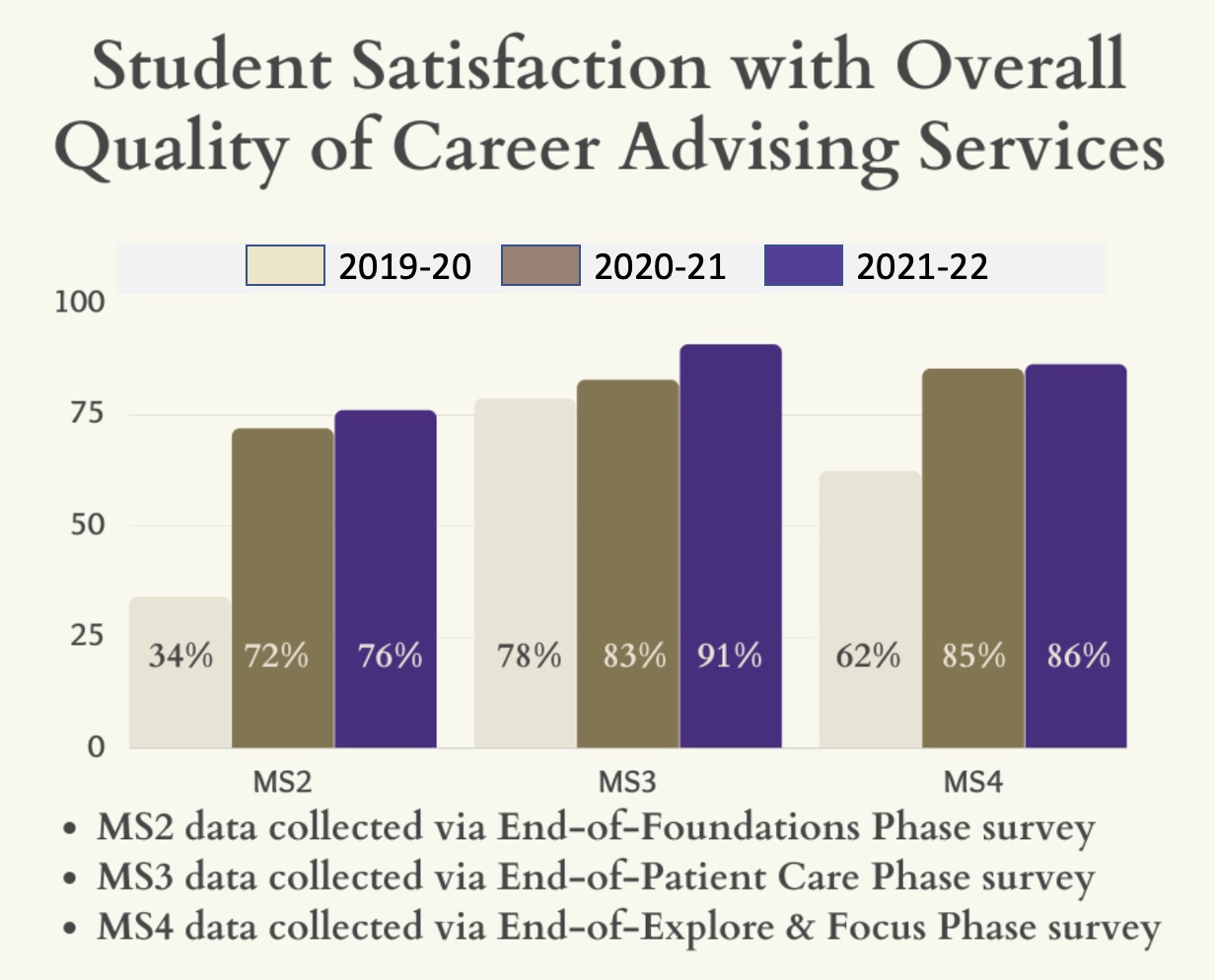
Below Graduation Questionnaire (GQ) table from students responses show that MS4 students’ overall satisfaction with career planning services improved significantly from 58% in 2020 to 75% in 2021. In 2022, satisfaction as reported on the GQ declined by 3% to 72% and the team is continuously adapting their strategies to improve the services.
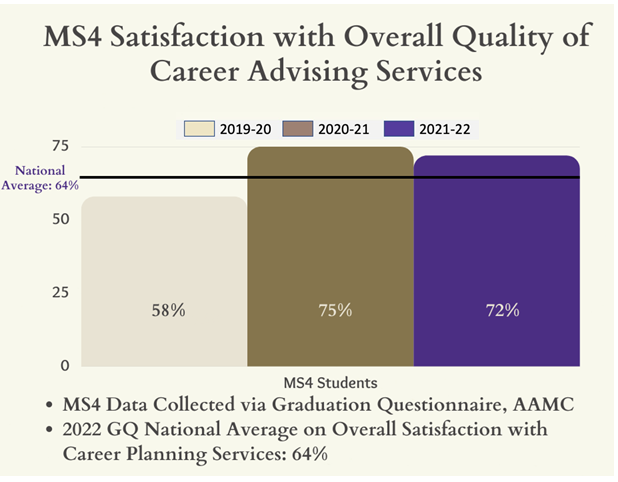
ACT
The key findings from student surveys identified gaps in resources and services, and the need to further develop strategic partnerships. Consequently, the team implemented the following initiatives:
- Increased career advising support and career planning resources for Foundations Phase students.
- Provided a required 1:1 appointment with dedicated career advisor
- Provided an Autumn career planning workshop for MS2s
- Improved web content including the addition of a career planning timeline and a video library of 80+ career exploration and specialty interest group panels
- Provide seven career panels aligned with the Foundations Phase curriculum in partnership with faculty in 23 specialties
- Increased access & clarity of information available to third-year students for planning their fourth-year.
- Developed a webinar with multiple SOM partners to provide a planning framework and answer career planning questions
- Launched a fourth-year career planning webpage and led the vision and development of the general fourth year planning webpages with multiple SOM partners
- Created 25 Specialty Guides in partnership with Specialty Career Advisors
- Implemented measures to assess student readiness for residency interviews.
- Provided faculty mock interviews to prepare students for residency interviews
- Increased Career Planning Support for BIPOC, URiM & First-Generation students
- Increased the number of residents listed in the Residents in Medicine (RIM) Directory who are Black, Indigenous or People of Color. The RIM is a list of UWSOM alumni who have offered to serve as a resource for students preparing to apply to residency
- Developed the BIPOC Physician Roster
The Career Advising team’s work shows what it means to be student-centered in their services and resources by implementing changes based on student feedback while staying focused on the mission. We would like to acknowledge the tireless work of the rest of the Career Advising team including Tonja Brown and Linh Ngo for their dedicated services to our students across the regions.
About the Plan-Do-Study-Act (PDSA) tool:


